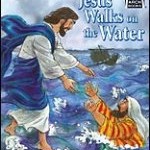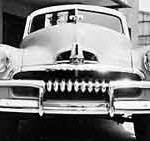This section is used if there is no megaphone)
(I was given this funnel the other day, it wasn’t long before I found out that it doesn’t make a very good water filter. However, since then I have learnt what this funnel is really designed used for…to pour water or oil into a car engine. As Australians, being very industrious and inventive, we know there are always 101 more uses for things on top of what they were originally designed for. The saying goes ‘necessity is the mother of invention’, our necessity is that some people find it a little hard to hear, particularly when the speakers are not turned on. Well, this funnel makes an ideal tool to amplify sounds.)
(Use the funnel back to front)
There you go! Now you can hear me much more clearly…can’t you? Why not?
(if there is a megaphone, talk about how you know how people can’t always hear, so you have expertise in amplification and so brought along a megaphone)
(use it back to front)
There you go! Now you can hear me much more clearly…can’t you? Why not?
Now there’s a lesson for young players…just because you have been given all the right tools, doesn’t mean you are using them in the right way!
Peter, one of the disciples, was a young player in the ministry of Jesus and he had a lesson to learn. He thought he knew it all and was on a high after confessing who Jesus was ‘the Christ, the Son of the living God’. Just because he knew who Jesus was, just because he had the information and could see the need for a messiah, didn’t mean he was able to correctly apply his knowledge. It didn’t mean he really knew what Jesus must do to be ‘the Christ, the Son of the living God’.
Jesus did and he could no longer hold it to himself. It was time for the disciples to know the full extent of his mission; to know clearly what it means for them to be his disciples. Just when Peter and the others where on a high, thought they knew their direction, their vision and mission, thought it was all glory and power from here, Jesus pulls the rug from under them ‘explaining that he must go to Jerusalem and suffer many things at the hands of the elders, chief priests and teachers of the law, and that he must be killed and on the third day be raised to life.’ The complete opposite to Peter’s vision.
If we could only get into the mind of Peter, to know how he would have felt at this very moment. We can’t, but we can imagine his devastation, his distress at this news. His vision of Jesus and how he is to be the messiah will be completely and utterly destroyed if he dies. So Peter took things into his own hands, obviously Jesus doesn’t understand. “Never, Lord!” he said. “This shall never happen to you!” The mission of God can’t die with you. No, you must do it my way Jesus.’ Peter though he had the tools for God’s mission and knew exactly what to do, yet Jesus has some very harsh words to him ‘”Get behind me, Satan! You are a stumbling block to me; you do not have in mind the things of God, but the things of men.”
Jesus is saying to Peter, yes you have the tools of a disciple, yes you know who I am, yes you know the need for mission, but you have got it all wrong. Peter had yet to realise the seriousness of our human condition, our total sinfulness and unbelief. He didn’t understand what it would take for Jesus to save people; save us from sin, death and the devil. He didn’t understand that Jesus would have to suffer and die for us…that’s what is needed, not some cover up; some sort of soft option, only the death of Jesus would suffice if we are to be saved from the devil’s grip.
Peter had the tools, he had heard the word, but he is intending to use them in the wrong way, like when I was using the megaphone the wrong way around, it was never going to achieve anything. As long as Peter though he knew best, though he knew how to control Jesus and his destiny, nothing could be achieved. Peter wanted God his way, wanted mission without suffering, glory without the pain. He wanted salvation without the cross. Jesus rebukes Peter for this, for only death will pay the price of sin; only his death on the cross, in our place, would bring about the true mission of God.
How often, as Jesus disciple’s, have we failed to comprehend what is going on? How often have we thought that we have everything in control, we have all the tools of mission, know everything about ourselves, about sin and grace, about Jesus, and about salvation? How often have we wanted to be followers of Jesus, but like Peter, only by our way, not by the way of the cross? Perhaps for many years now we have been holding the megaphone of God’s grace the wrong way around; trying to be disciples on our own terms, without any suffering, without the cross; without dying to self and living for Christ. Perhaps this is why our churches are emptying?
Perhaps Jesus is also rebuking us…‘”Get behind me, Satan! You are a stumbling block to me; you do not have in mind the things of God, but the things of men.’ A cutting word from Jesus, but perhaps it’s a word that we need to hear and hear again and again as disciples of Jesus. We need to allow ourselves to be told that at times we are receiving and using God’s grace to us, the forgiveness of sins and mercy for the sake of Christ, the wrong way round. We are using it for our benefit, for our glory and for our purposes and not God’s. We want salvation, but at no cost to us, or to God.
At times, like Peter, we think we have it all together and have no need for Jesus; we know what is needed to save us. The megaphone of God’s grace, his mission to us, cannot achieve its purpose for us and for others, if we continue think we don’t need the cross, death of our sin and death to ourselves.
When using the megaphone backwards, nothing is heard. God’s mercy is not being received; not being heard when the cross is not proclaimed. And because of this, perhaps you and I and the world are not hearing that Jesus works salvation through suffering; he brings life out of the lashes and grace from the grave. Isaiah foresaw Jesus’ mission when he said ‘he was pierced for our transgressions, he was crushed for our iniquities; the punishment that brought us peace was upon him, and by his wounds we are healed.’
This is the good news we need to hear. This is the good news we need to apply to ourselves; the turning around of the megaphone of grace. He was delivered over to death for our sins and was raised to life for our justification. As a disciple of Jesus, we trust and believe that are put to death before we are brought to life. That is, our sinful nature and everything that entails; our personal ambitions, our good works to get to heaven, our secret desires, our efforts to be god…yes everything, is put to death in our baptism and repentance, so that our new self, which rests in Jesus, is brought to life. We are a completely new person in Christ. St Paul had God’s megaphone of grace pointing the right direction when he said ‘we are buried with Jesus in baptism and raised with him through faith in the power of God, who raised Jesus from the dead.’
This is what Jesus means when he says ‘For whoever wants to save his life will lose it, but whoever loses his life for me will find it.’ We lose our life of selfish ambition in baptism, yet we also then gain true life in Christ when we trust in him; we are raised to find life in death. And by faith we know that Jesus frees us from trying to play god and to do it all and be it all. He frees us from sin and death, and he frees us from the demands of the law of this world which always accuse us to take control.
Let’s turn around the megaphone of God’s grace and once again clearly hear God’s word to us. This is Jesus clearly speaking to you ‘Just as Moses lifted up the snake in the desert, so the Son of Man must be lifted up, that everyone who believes in him may have eternal life. “For God so loved the world that he gave his one and only Son, that whoever believes in him shall not perish but have eternal life. For God did not send his Son into the world to condemn the world, but to save the world through him.’ Amen

